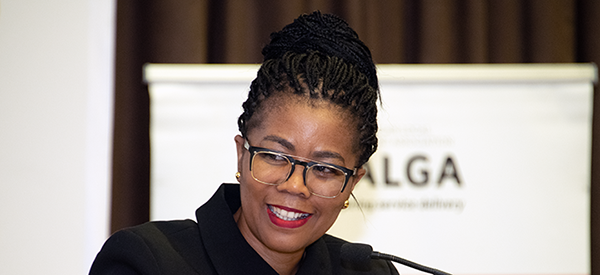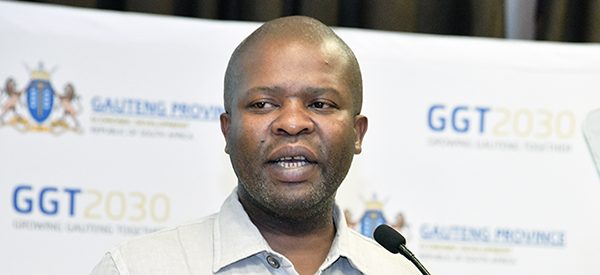News & Media
Maile: Entrepreneurship and self-reliance light the way for Africa’s growth
On 27 March 2025, Unisa, in partnership with the South African Local Government Association (SALGA) and the Pan African Chamber of Commerce, hosted the prestigious African Mayors Conference on Entrepreneurship, themed Advancing the 2030 Vision for Economic Growth, Urban Transformation, and Sustainable Job Creation, at its Muckleneuk Campus, Tshwane.

Prof Puleng LenkaBula, Unisa Principal and Vice-Chancellor
The event was attended by various dignitaries, mayors from across the continent, councillors, municipal leaders, academics from various universities, entrepreneurs, members of the Pan African Chamber of Commerce, and representatives of various financial organisations and leading development agencies. In addition, the event was attended by His Royal Highness, Chief Nyalala Pilane, leader of Bakgatla Ba Kgafela.
Inspiring and supporting entrepreneurship
In her welcome address, Unisa Principal and Vice-Chancellor (VC), Prof Puleng LenkaBula, said that the United Nations report and research insights from universities and other institutions across the world point to an inevitable future when it comes to urbanisation and human settlements. "The vast majority of the world’s population will be urban dwellers within the next three decades," she said.
The VC stated that this poses challenges and opportunities. "Firstly," she said, "it requires the necessary leadership and ideas that can provide sustainable solutions for the present and future generations. Secondly, it calls on cities to partner with various social partners, including universities, to develop sustainable solutions and outcomes. Finally, it calls on every citizen to be mobilised and remain actively engaged in the process of change wherever they live."
Continuing, the VC said that in a rapidly changing world and urban landscape it can be easy to migrate poverty or merely oversee the urbanisation of poverty in the absence of bold, imaginative, and innovative leadership and ideas. She emphasised: "As you can see already, migration and urbanisation can cause untold harm among people and nations if it is not accompanied by proper research, planning and development. The challenges and opportunities of migration and urbanisation are global in nature. They affect Europe as much as they affect Asia, Africa and the Americas."
Unlocking ecosystems for entrepreneurs to thrive
The VC stressed that ways should be found to inspire and support entrepreneurship in the industries of today and those of the future. "With Africa’s youthful population and abundant talent, our region is better positioned to take advantage of the mega-trends of migration and urbanisation locally and beyond," she said.
Concluding, the VC expressed optimism regarding the proceedings of the conference: "I have no doubt that you will focus on practical solutions - about how we can improve regulatory frameworks, unlock investment opportunities, and build the necessary infrastructure and ecosystems so that entrepreneurs and businesses can thrive and that people can live happier and longer lives. Let us commit to making entrepreneurship the driving force of Africa’s economic transformation."
Unisa, centre of African hope
In his keynote address, the Honourable Lebogang Maile, Gauteng MEC for Finance and Economic Development, quoted Robet Sobukwe who said that education in African universities is a service to Africa and her people. Maile added: "This situates education within the context of the development of the continent. And so there is a great symbolism in having a conference of this magnitude taking place at Unisa, because it is a vehicle of service for Africa."

Keynote speaker, the Honourable Lebogang Maile (MPL), Gauteng MEC for Finance and Economic Development
Maile said that deliberating on entrepreneurship in Africa necessitates a deep appreciation of the substantive questions that must be answered to inform the solutions that entrepreneurs must develop to contribute to the resolution of African problems.
He said that Gauteng Province makes it a pivotal centre for this discourse to take place, adding: "While it is the smallest province, it is the biggest by population and contributes 35% of the total national gross domestic product (GDP) of the country – it is the heartbeat of the continental economy."
Significance of two geographies – rural and urban
Continuing, Maile said that this gathering of mayors is of significance because, firstly, "the majority of the mayors are leaders of cities across Africa, a continent experiencing rapid urbanisation with its urban population increasing from 31% in 1990 to just over 60% in 2025". Maile further said that cities have doubled from 3 300 to 7 600 with their accumulative population increasing by 500 million people. "This," he said, "presents both opportunities and challenges for African development, requiring careful planning and management of urban growth and economies, as cities are important sites for development – the primary location for economic activity, generating a significant portion of GDP and creating a majority of the country’s employment opportunities."
Maile explained that urbanisation contributes to economic growth, with studies showing that approximately 30% of Africa’s per capita GDP growth in the last 20 years is attributed to urban areas. "They are centres of innovation and attract local and global businesses, thereby fostering economic development," he said.
Maile stated that rural areas are an important component of economic development of the continent due to their role in food production, employment, cultural preservation and resource management, making them essential for sustainable development and economic growth. "We know agriculture is the backbone of many African economies, with a large percentage of people living in rural areas working in agriculture," he explained. "Furthermore, they are rich in mineral resources, which are vital for economic development. I outline the interdependence of rural and urban areas to emphasise the importance of the responsibility that you as mayors have been entrusted to carry out: the desires of over 1.5 billion people who represent 18.83% of the global population."
Continuing, Maile emphasised that this gathering must go beyond the exchange of entrepreneurship ideas, and also serve as a platform to deliberate on the future of the continent. He added: "This should be a future that depends greatly on the interventions that we make towards building strong, sustainable and inclusive economies spearheaded by entrepreneurship supported by policies and initiatives to thrive."
Maile said that it is crucial for Africa’s economic transformation towards driving growth, creating jobs, fostering innovation and promoting self-reliance, especially in addressing unemployment and poverty, that it must uphold entrepreneurship, adding: "Entrepreneurship is a significant driver of job creation, particularly in the informal sector, which is a major source of employment for many African countries. In addition, it is a powerful tool for empowering young men and women, who often face significant barriers to employment and economic emancipation."
Concluding, the MEC lauded Unisa, stating that the university is well positioned to rise in the academic rankings because of its astute standing in solving Africa’s needs and societal problems, and particularly in fostering entrepreneurship among its various catalytic niche areas enmeshed in the university’s high-quality curricula.
Throughout the conference, various mayors, councillors and dignitaries continued to table key initiatives aimed at economic growth, innovation, and bolstering entrepreneurship among young men and women on the African continent.
* By Godfrey Madibane, Acting Journalist, Department of Institutional Advancement
** Photography by Shooheima Champion, Multimedia Centre
Publish date: 2025/03/28

 Unisa co-hosts G20 community outreach in the Eastern Cape
Unisa co-hosts G20 community outreach in the Eastern Cape
 Unisans gain membership of prestigious science academies
Unisans gain membership of prestigious science academies
 Advocating for disability transformation through servant leadership
Advocating for disability transformation through servant leadership
 Unisa Press continues to illuminate the publishing space
Unisa Press continues to illuminate the publishing space